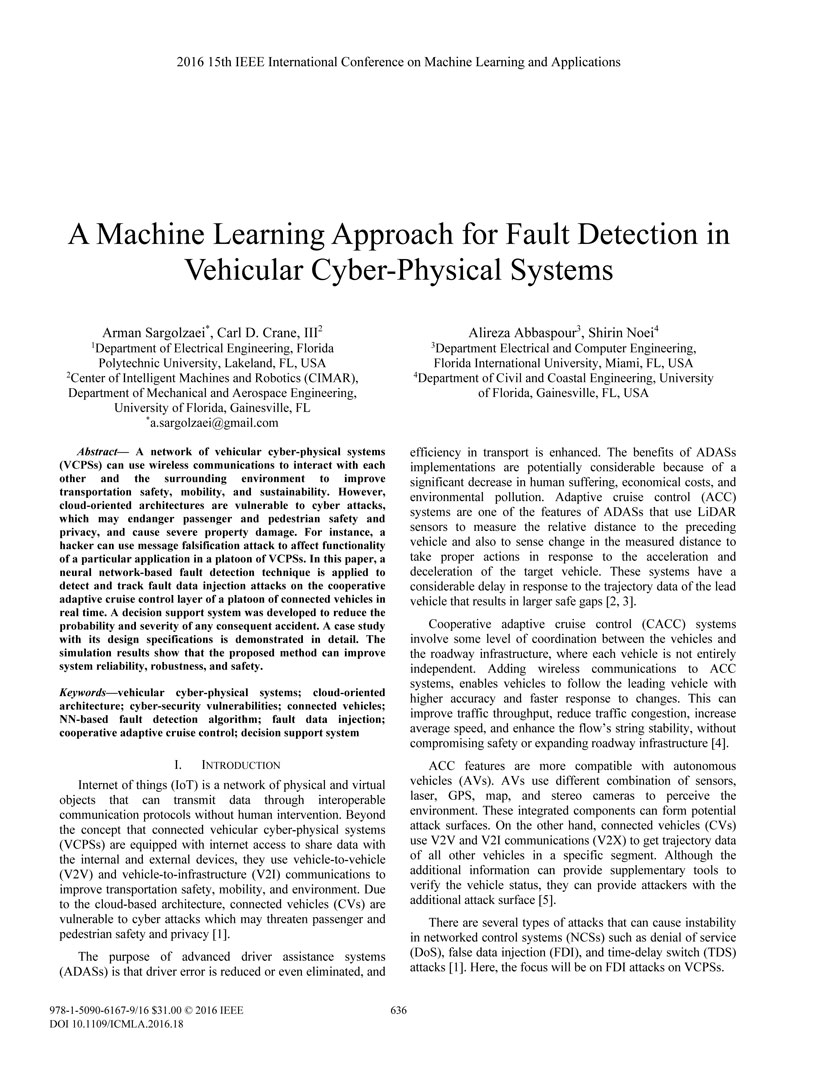AV Cyber and Controls
A Decision Support System for Improving Resiliency of Cooperative Adaptive Cruise Control Systems
Advanced driver assistance systems (ADASs) enhance transportation safety and mobility, and reduce impacts on the environment and economical costs, through decreasing driver errors. One of the main features of ADASs is cruise control system that maintains the driver's desired speed without intervention from the driver. Adaptive cruise control (ACC) systems adjust the vehicle's speed to maintain a safe following distance to the vehicle in front. Adding vehicle-to-vehicle and vehicle-to-infrastructure communications (V2X) to ACC systems, result in cooperative adaptive cruise control (CACC) systems, where each vehicle has trajectory data of all other vehicles in the same lane. Although CACC systems offer advantages over ACC systems in increasing throughput and average speed, they are more vulnerable to cyber-security attacks. This is due to V2X communications that increase the attack surface from one vehicle to multiple vehicles. In this paper, we inject common types of attack on the application layer of connected vehicles to show their vulnerability in comparison to autonomous vehicles. We also proposed a decision support system that eliminates risk of inaccurate information. The microscopic work simulates a CACC system with a bi-objective PID controller and a fuzzy detector. A case study is illustrated in detail to verify the system functionality.Full Publication Here
A Machine Learning Approach for Fault Detection in Vehicular Cyber-Physical Systems
A network of vehicular cyber-physical systems (VCPSs) can use wireless communications to interact with each other and the surrounding environment to improve transportation safety, mobility, and sustainability. However, cloud-oriented architectures are vulnerable to cyber attacks, which may endanger passenger and pedestrian safety and privacy, and cause severe property damage. For instance, a hacker can use message falsification attack to affect functionality of a particular application in a platoon of VCPSs. In this paper, a neural network-based fault detection technique is applied to detect and track fault data injection attacks on the cooperative adaptive cruise control layer of a platoon of connected vehicles in real time. A decision support system was developed to reduce the probability and severity of any consequent accident. A case study with its design specifications is demonstrated in detail. The simulation results show that the proposed method can improve system reliability, robustness, and safety.Full Publication Here

 This is an example offering which would allow your customers to schedule a time to meet with you. Offerings automate customer interactions online by allowing them to schedule a service/appointment, pay for a lesson, purchase tickets/vouchers, request a quote, all with online payments. You can create as many as you like with pictures, descriptions, price options, and even questionnaires.
This is an example offering which would allow your customers to schedule a time to meet with you. Offerings automate customer interactions online by allowing them to schedule a service/appointment, pay for a lesson, purchase tickets/vouchers, request a quote, all with online payments. You can create as many as you like with pictures, descriptions, price options, and even questionnaires.